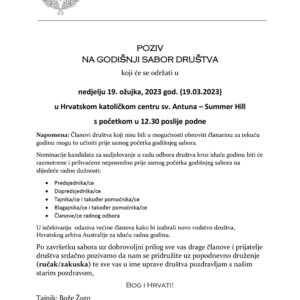While televised street interviews of citizens on Croatia’s news TV programs during the past week have yielded reticence, caution, rejection, and enthusiasm, regarding the imminent and historic issue of government bonds it is, at the same time, officially touted as an avenue of much needed investment boost to Croatia’s economy and national goals.
Croatian citizens and residents have been given the priority and opportunity to register for Croatian state bonds between 22 February and March 1, 2023; 500 euro being the minimum amount a citizen can deposit.
On 3 March 2023 corporations and institutional investors will be given the opportunity to purchase the bonds, however this opportunity will last only one day. The maturity period is two years. The interest rate is 3.25%.
Minister of Finance Marko Primorac said that the target value of the bonds issue is one billion euros, and the goal is to increase savings that citizens have in banks at relatively low interest rates and also enable citizens to participate in the public debt market.
“However, the goals are also of a broader nature, that is, through the active participation of citizens on the primary market, and then on the secondary, to further develop the capital market, encourage financial literacy, as well as other positive effects that such an issue can have,” said Primorac.
He emphasised that the minimum interest rate on bond issuance is 3.25%. The market interest rate is determined according to market circumstances, but 3.25% is the minimum coupon interest that citizens can expect, and it can be slightly higher in accordance with market circumstances.
According to the Ministry of Finance of the Republic of Croatia registration for the government bonds will be done in more than 500 bank branches which are the leading agents of the bonds issue – Erste&Steiermärkische bank, OTP bank, Privredna banka Zagreb, Raiffeisenbank Austria, Zagrebačka bank – as well as the Hrvatska poštanska banka (Croatia Postal Bank), which, at the same time, is the co-issuer of bonds together with the government. Citizens do not need to hold a bank account with any of these banks to qualify for registration and purchase of government bonds.
First round investors may be natural persons of legal age who are Croatian citizens, as well as legal persons, foreign citizens, who are residents of the Republic of Croatia. Ministry of Finance and the Zagreb Stock Exchange website are to carry important information about government bond issues and subscriptions, including for those citizens who are not clients of one of the banks that are the leading agents and co-arrangers of the issue, said Primorac, who directed citizens to the online brochure on bonds published by the Croatian Chamber of Commerce (HGK).
Upon registration, citizens can pay the desired amount of bonds immediately, they can also do it later, up to March 1, and Primorac advises that it is better to do it as soon as possible. Ministry of Finance webpage https://mfin.gov.hr as well as the Zagrebačka burza/ Zagreb Stock Exchange webpage https://zse.hr are holding all necessary information for people wishing to purchase Croatian government Bonds. It is envisaged that once sold the bonds will be listed on the stock exchange market.
The maturity of the bond will be two years.
If by any reason citizens who purchased the bonds cannot hold them until maturity and want to sell them on the secondary market, they may reportedly be faced with price changes. In that case, there is a certain minimal risk that they will not receive the amount they initially invested.
Prime Minister Andrej Plenkovic pointed out that this issue of government bonds aims to dynamise the domestic capital market, as well as send a message of confidence in government bonds, in domestic public finances, and everything that has been done through systematic work and responsible management of public finances in the past years.
Whilst generally government bonds are among the safest forms of investment because of the alarming state of the economy and quite a bit of distrust in the government, there is loud scepticism on the streets of Croatia. The release of government bonds comes at the time of continued series of corruption scandals involving government ministers, of deposing old and naming new minister for development due to scandalous inaction in the past three years in reconstruction of earthquake devastated areas despite ample funds available from EU coffers, of parliamentary opposition initiatives for Prime Minister Andrej Plenkovic’s recall. At this stage, it seems that the parliamentary opposition’s call for the recall, sacking, of the Prime Minister is doomed for failure for the simple reason of there being “too many political cooks” and too little tangible “incriminating” evidence that usually justifies sacking or recalls. Besides that, the parliamentary opposition is in the parliamentary minority and there are no significant numbers of representatives from the ruling majority party willing to cross the floor on the matter.
Croatians living in Croatia are not used to bank term deposits like people living in the West; they are ¨”used to” the so-called current bank accounts. Investing in government bonds can in a way be compared to bank term deposits and this idea alone may frighten off some people who may be reluctant to place their money out of reach for two years. Hence, one may expect that most government bond buyers will be corporate or institutional investors.
When we look at the economic and political situation in Croatia, two years if there are no major disasters are very safe. The current push from the parliamentary opposition for Prime Minister’s recall does not help nor does it provide the citizens with serenity that their money will be safe if they invest it for two years. The almost precarious financial and economic situation in Croatia, at the bottom of Europe, does cause distrust in people even if the situation as seen as stable and likely to remain stable for the coming two years or so. Being a country that depends heavily on income from tourism a successful issue of government bonds will provide a boost towards betterment and realisation of national goals. But with the President of the country, Zoran Milanovic, publicly announcing he and his family will not for various reasons be buying any government bonds one’s trust in the whole process and issue is surely shaken. That is such an awful move by a country’s president, almost an attempt to sabotage the issue of government bonds. Milanovic did not have any duty as president of the country to publicly talk of what he and his family will or will not do with their personal bank savings. He revealed it to spite the government, I’m quite certain of that. A nationally bitter and destructive vantage point indeed! Ina Vukic





Komentari